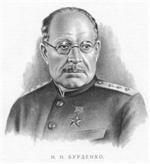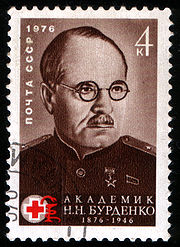
Nikolai Burdenko
Encyclopedia

Russians
The Russian people are an East Slavic ethnic group native to Russia, speaking the Russian language and primarily living in Russia and neighboring countries....
and Soviet surgeon
Surgeon
In medicine, a surgeon is a specialist in surgery. Surgery is a broad category of invasive medical treatment that involves the cutting of a body, whether human or animal, for a specific reason such as the removal of diseased tissue or to repair a tear or breakage...
, the founder of the Russian neurosurgery
Neurosurgery
Neurosurgery is the medical specialty concerned with the prevention, diagnosis, treatment, and rehabilitation of disorders which affect any portion of the nervous system including the brain, spine, spinal cord, peripheral nerves, and extra-cranial cerebrovascular system.-In the United States:In...
. He was Surgeon-General of the Red Army
Red Army
The Workers' and Peasants' Red Army started out as the Soviet Union's revolutionary communist combat groups during the Russian Civil War of 1918-1922. It grew into the national army of the Soviet Union. By the 1930s the Red Army was among the largest armies in history.The "Red Army" name refers to...
(1937-1946), an academician of the USSR Academy of Sciences
Russian Academy of Sciences
The Russian Academy of Sciences consists of the national academy of Russia and a network of scientific research institutes from across the Russian Federation as well as auxiliary scientific and social units like libraries, publishers and hospitals....
(from 1939), an academician and the first director of the Academy of Medical Sciences of the USSR (1944-1946), a Hero of Socialist Labor
Hero of Socialist Labor
Hero of Socialist Labour was an honorary title in the Soviet Union and other Warsaw Pact countries. It was the highest degree of distinction for exceptional achievements in national economy and culture...
(from 1943), colonel-general of medical services, Stalin Prize-winner (1941). He was a veteran of the Russo-Japanese
Russo-Japanese War
The Russo-Japanese War was "the first great war of the 20th century." It grew out of rival imperial ambitions of the Russian Empire and Japanese Empire over Manchuria and Korea...
, First World
World War I
World War I , which was predominantly called the World War or the Great War from its occurrence until 1939, and the First World War or World War I thereafter, was a major war centred in Europe that began on 28 July 1914 and lasted until 11 November 1918...
, Winter
Winter War
The Winter War was a military conflict between the Soviet Union and Finland. It began with a Soviet offensive on 30 November 1939 – three months after the start of World War II and the Soviet invasion of Poland – and ended on 13 March 1940 with the Moscow Peace Treaty...
and the German-Soviet War.
Biography
Nikolay Burdenko was born 3 June 1876 in the village of KamenkaKamenka, Penza Oblast
Kamenka is a town and the administrative center of Kamensky District of Penza Oblast, Russia, located on the Atmis River west of Penza. Population: 30,000 .It was founded in the 18th century and granted a town status in 1951....
in Nizhnelomovsky Uyezd of Penza Governorate. In 1891, he entered to the theological seminary and after graduation in 1897 he went to Tomsk
Tomsk
Tomsk is a city and the administrative center of Tomsk Oblast, Russia, located on the Tom River. One of the oldest towns in Siberia, Tomsk celebrated its 400th anniversary in 2004...
where has been admitted to the recently opened Tomsk State University
Tomsk State University
Tomsk State University , formerly Imperial Tomsk University, is the first university in Siberia—it was founded in 1878 in Tomsk, Russia. TSU opened in 1888 with only one department, the medical school...
. After finishing two courses, Burdenko was excluded from the university for the participation in the student revolutionary movement and was forced to leave Tomsk. In 1906, he graduated from the University of Tartu
University of Tartu
The University of Tartu is a classical university in the city of Tartu, Estonia. University of Tartu is the national university of Estonia; it is the biggest and highest-ranked university in Estonia...
and became in 1910 the professor of that university. In 1918, he becomes the professor of the University of Voronezh; from 1923, he was the professor of the medical department of the Moscow State University
Moscow State University
Lomonosov Moscow State University , previously known as Lomonosov University or MSU , is the largest university in Russia. Founded in 1755, it also claims to be one of the oldest university in Russia and to have the tallest educational building in the world. Its current rector is Viktor Sadovnichiy...
. This department was in 1930 reorganized into the 1st Moscow Medical Institute. Here he led until the end of his life the surgical clinic of the faculty, which now bears his name.
Since 1929, Burdenko was the director of the neurosurgical clinic of the X-ray
X-ray
X-radiation is a form of electromagnetic radiation. X-rays have a wavelength in the range of 0.01 to 10 nanometers, corresponding to frequencies in the range 30 petahertz to 30 exahertz and energies in the range 120 eV to 120 keV. They are shorter in wavelength than UV rays and longer than gamma...
institute of the People's Commissariat of Public Health, on the base of which in 1934 was founded the world's first neurosurgical institute. During World War II
World War II
World War II, or the Second World War , was a global conflict lasting from 1939 to 1945, involving most of the world's nations—including all of the great powers—eventually forming two opposing military alliances: the Allies and the Axis...
, in 1943, Burdenko was appointed as the chairman of the Extraordinary State Commission
Extraordinary State Commission
The Extraordinary State Commission – fully: "Extraordinary State Commission for ascertaining and investigating crimes perpetrated by the German–Fascist invaders and their accomplices, and the damage inflicted by them on citizens, collective farms, social organisations, State enterprises and...
of the Katyn massacre
Katyn massacre
The Katyn massacre, also known as the Katyn Forest massacre , was a mass execution of Polish nationals carried out by the People's Commissariat for Internal Affairs , the Soviet secret police, in April and May 1940. The massacre was prompted by Lavrentiy Beria's proposal to execute all members of...
. In the fact-finding of the commission, led by Burdenko, responsibility for these crimes was laid on the Germans; those findings are now considered by the CIA
Central Intelligence Agency
The Central Intelligence Agency is a civilian intelligence agency of the United States government. It is an executive agency and reports directly to the Director of National Intelligence, responsible for providing national security intelligence assessment to senior United States policymakers...
false and ordered by the Soviet government, which was responsible for the massacre https://www.cia.gov/library/center-for-the-study-of-intelligence/csi-publications/csi-studies/studies/winter99-00/art6.html.

Central nervous system
The central nervous system is the part of the nervous system that integrates the information that it receives from, and coordinates the activity of, all parts of the bodies of bilaterian animals—that is, all multicellular animals except sponges and radially symmetric animals such as jellyfish...
and peripheral nervous system
Peripheral nervous system
The peripheral nervous system consists of the nerves and ganglia outside of the brain and spinal cord. The main function of the PNS is to connect the central nervous system to the limbs and organs. Unlike the CNS, the PNS is not protected by the bone of spine and skull, or by the blood–brain...
; he investigated the reason for appearance and the methods of treating shock, made a large contribution to the study of the processes, which appear in the central and peripheral nervous system in connection with the surgical operation in the case of the sharp injuries; he developed the bulbotomy - operation on the upper division of the spinal cord
Spinal cord
The spinal cord is a long, thin, tubular bundle of nervous tissue and support cells that extends from the brain . The brain and spinal cord together make up the central nervous system...
. Burdenko created the school of surgeons with the sharply pronounced experimental direction. Works in the domains of the oncology
Oncology
Oncology is a branch of medicine that deals with cancer...
of central and vegetative nervous system, pathology
Pathology
Pathology is the precise study and diagnosis of disease. The word pathology is from Ancient Greek , pathos, "feeling, suffering"; and , -logia, "the study of". Pathologization, to pathologize, refers to the process of defining a condition or behavior as pathological, e.g. pathological gambling....
of the liquor circulation, cerebral blood circulation were the valuable contribution of Burdenko and his school to theory and practice of neurosurgery.
It was rewarded with three Orders of Lenin
Order of Lenin
The Order of Lenin , named after the leader of the Russian October Revolution, was the highest decoration bestowed by the Soviet Union...
, with other orders and medals. He was the honorary member of the International Society of surgeons, Royal Society
Royal Society
The Royal Society of London for Improving Natural Knowledge, known simply as the Royal Society, is a learned society for science, and is possibly the oldest such society in existence. Founded in November 1660, it was granted a Royal Charter by King Charles II as the "Royal Society of London"...
of London
London
London is the capital city of :England and the :United Kingdom, the largest metropolitan area in the United Kingdom, and the largest urban zone in the European Union by most measures. Located on the River Thames, London has been a major settlement for two millennia, its history going back to its...
.
The SRI of the neurosurgery in Moscow
Moscow
Moscow is the capital, the most populous city, and the most populous federal subject of Russia. The city is a major political, economic, cultural, scientific, religious, financial, educational, and transportation centre of Russia and the continent...
, Сentral military hospital, the faculty of the surgical clinic of the Sechenov's medical academy, Penza
Penza
-Honors:A minor planet, 3189 Penza, discovered by Soviet astronomer Nikolai Stepanovich Chernykh in 1978, is named after the city.-Notable residents:...
provincial clinical hospital, a street in Moscow, and a street in Voronezh
Voronezh
Voronezh is a city in southwestern Russia, the administrative center of Voronezh Oblast. It is located on both sides of the Voronezh River, away from where it flows into the Don. It is an operating center of the Southeastern Railway , as well as the center of the Don Highway...
were named after Burdenko.
An asteroid
Asteroid
Asteroids are a class of small Solar System bodies in orbit around the Sun. They have also been called planetoids, especially the larger ones...
(6754 Burdenko
6754 Burdenko
6754 Burdenko is a main-belt asteroid discovered on October 28, 1976 by Zhuravleva, L. V. at Nauchnyj.- External links :*...
) is also named in his honor.

